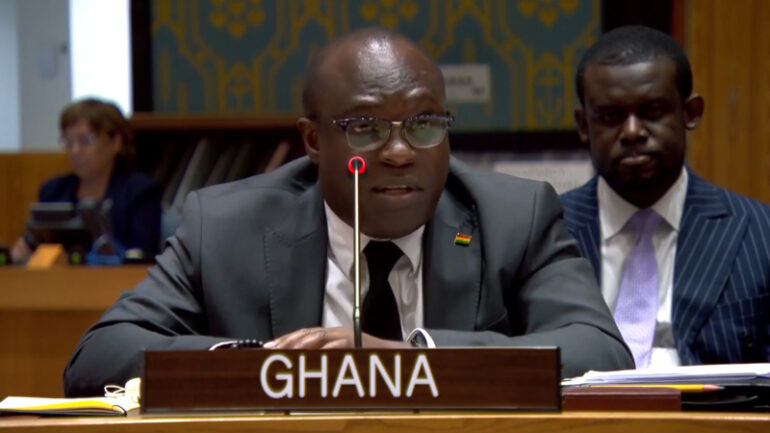UNSC Briefing on the Maintenance of Peace and Security of Ukraine

Ambassador Harold Agyeman
Ghana’s Representative to the United Nations
New York, New York
July 17, 2023
UNITED NATIONS SECURITY COUNCIL BRIEFING ON THE MAINTENANCE OF PEACE AND SECURITY OF UKRAINE
Mr. President,
It has been 510 days since the war against Ukraine begun. Regrettably, today, we are less close to finding a resolution to the conflict than when it started, and deepening differences may cause widespread and long-term damage to multilateralism and our shared ambition for global peace and security. Already we have seen several thousand lives lost on both sides; whole cities that have been destroyed; safeguards against nuclear facilities that have been jeopardized; amplified and reckless rhetoric on nuclear weapons that have risked lowering the threshold of its use; and the proliferation and use of dangerous weapons that have rolled back our collective ambitions on arms control. The impact of the brutal war on Ukraine has not been limited to its suffering masses. It has cast its dark shadow across the world, aggravating the socio-economic conditions of many countries that were already reeling from the adverse effects of the COVID-19 pandemic. Evolving national security doctrines are also responding to the war in Ukraine, in ways that do not necessarily support the strengthening of our collective security.
Mr. President,
As I thank the United Kingdom for organizing this meeting and welcome the briefing by USG Rosemary DiCarlo, I appeal that the gaps between the expectations of 1945 and the reality of today,
should be a reminder of the further efforts all of us need to take in amplifying the voice of peace and establishing credible pathways of dialogue to help Ukraine and the Russian Federation to stop this needless war. On our part, Ghana has three (3) main points that it would like to highlight for this meeting.
First, we emphasize the need for the parties to heed the calls for an immediate cessation of hostilities. The militarization of the conflict, fueled by the manifest combative choices of the parties, has not changed the dynamics of the conflict on the ground. Constrained by the absence of a common message from this Council, it is well past time for the parties to heed to the voice of the 11th Emergency Special Session of the General Assembly, which in all its seven (7) resolutions, called for an immediate end to the war in favour of a peaceful settlement.
Secondly, bearing in mind the civilian casualties, gross violations of human rights and the extensive destruction that has accompanied the war, we are compelled to reiterate to the warring parties their obligation to strictly comply with international law, including international humanitarian law, especially the requirement to make a distinction of ordinary non-combatant populations to avoid harming them and as well as the facilities critical to their survival. Targeting civilians and civilian infrastructure is morally unacceptable and constitutes violations of international humanitarian law and human rights laws.
We also urge Ukraine and the Russian Federation to embrace the five (5) concrete principles put forward by the Director General of the International Atomic Energy Agency to preserve the safety and security of the Zaporizhzhia Nuclear Power Plant. We express appreciation for the coordinated humanitarian response spearheaded by United Nations humanitarian agencies and international partners, as their efforts have been vital in assuring the people of Ukraine that they have not been forgotten by the rest of the world.
Thirdly, to help manage the adverse impact of the war in Ukraine on third States, it is important that every grain produced should be able to reach the global market. In this regard, we are deeply
disappointed that the Black Sea Grain Initiative, which has since its commencement in July 2022 delivered over 32 million tonnes of food commodities to 45 countries, has not been renewed.
A renewal of the initiative, accompanied by a resolution of the challenges with the export of ammonia to global markets, as well as of Russian agricultural products and fertilizers envisaged by the MOU between the Russian Federation and the United Nations, would help prevent speculative spikes in global food prices, strengthen global food security, and prevent other knock-on effects.
Mr. President,
In closing, allow me to reiterate the futility of the use of force as an instrument to pursue relations with other States in the present era. It has not served the interest of others well and it would not do so in the present circumstance. Our common renunciation of war in article 2 (4) of the Charter reflects the firm position of the international community on the matter and our expectation that this obligation and other moderating voices would drive us to seek a path of lasting and comprehensive peace for Ukraine and the Russian Federation, through dialogue and diplomacy.
Finally, Ghana’s commitment of support for the sovereignty, political independence and territorial integrity of Ukraine remains undiminished.
I thank you.
